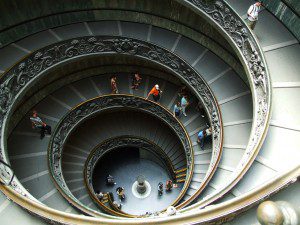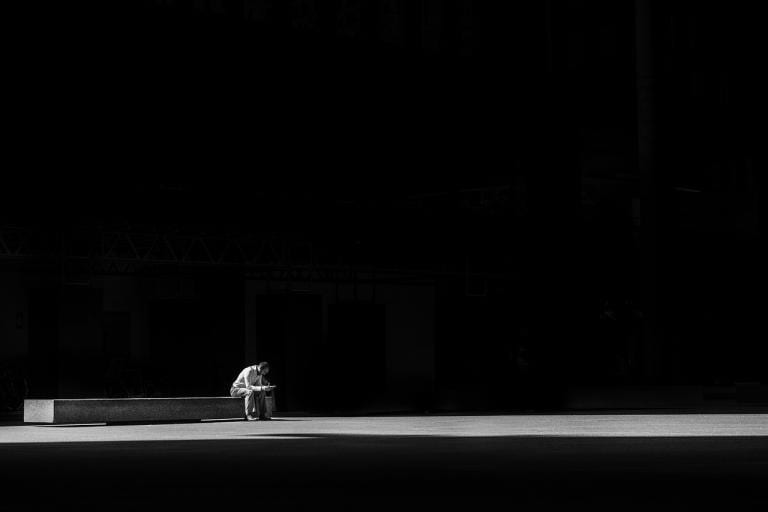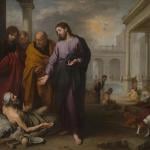A friend just pointed out to me that I’ve been answering the question of “Why I am Catholic” without actually getting to the Catholic part. I’ve been having some lovely conversations about theism (and would like to thank my atheist interlocutors for their gracious and intelligent responses), but I have gone from belief in God to belief in the Church.
There are two basic answers to why Catholicism, but I can’t get both of them into one post so I’ll start with the negative answer. I’m Catholic because I don’t see any other serious possibilities.
When I first started looking into the God question for the first time, I didn’t immediately settle on the Church. My first inclination was to investigate other options – any other option, really – rather than throw my lot in with an organization that seemed to be the foremost bastion of heteropatriarchy in the Western world. I was a feminist. I was in a lesbian relationship. I had a pretty strong psychological stake in finding some other faith that I could join.
My first avenue of investigation was Paganism, specifically the modern brand of do-it-yourself ritualism that often goes under the name of Wicca. Wicca was attractive because it provided a Goddess, made few moral demands, and allowed for a lot of ritual creativity. It also had the kind of Celtic faery mystique that I’ve always found appealing. So I got a Wiccan friend to recommend some books, I attended a meeting of the local coven, and tried a couple of smaller, private rituals. It was fun, but it felt kind of like the spiritual equivalent of a live-action role-playing game. I was playing at magic, but I was absolutely unable to suspend my disbelief sufficiently to believe that any of the spells would actually work. Neo-Paganism suffered from a lack of intellectually hefty theology, and a kind of rootlessness. Although it claimed to reach back into pre-Christian history, and I knew enough real history to know that the modern practices had only the most superficial relationship to anything practised in Druidic Britain or ancient Gaul. Finally, there was the problem of the community itself: it was very nice to be able to talk about religion and spirituality with like-minded young women, but I felt that there was something wrong with a faith that really only attracted a very specific demographic of educated, middle-upper-class, privileged white feminists.
Eastern religions were appealing because they had the things that Wicca lacked: tradition, wide-ranging appeal, real theology, and a well developed ritual structure. My interest in the East was crushed very quickly, however, by a Hindu friend. He basically said that Westerners can’t really practice Eastern religions because we don’t see the world through “Eastern eyes.” What he was saying made immediate intuitive sense: although Hinduism is real for Hindus, and Buddhism is real for Buddhists, when Westerners adopt these religions it always feels at least a little fake. Probably the most obvious example is what happens to the idea of reincarnation when it’s transferred from East to West: in Hinduism and Buddhism, reincarnation is a cycle of suffering from which one wishes to escape, the goal is to reach a point of spiritual development where one stops coming back. In the Western versions of these faiths, reincarnation becomes a kind of perpetual cosmic joy-ride in which the soul accumulates good karma and steadily progresses from one wonderful life to another. Deeply ingrained Western sensibilities end up turning profound Eastern ideas into spiritual cotton-candy, and I wasn’t naive enough to think that I could transcend my own cultural context sufficiently to overcome that tendency.
I wasn’t prepared to become involved with the White appropriation of Native American culture, or any other indigenous non-European tradition. So I was kind of left with the Judeo-Christian set of beliefs. I knew a lot of Muslims, had grown up in a Muslim neighbourhood, and had respect for Islam – but absolutely no interest in it. It seemed to have the same problems as Catholicism, only more so, and without the pretty Cathedrals. As for Judaism, I knew my Bible reasonably well having grown up in a devout Anglican household, and I couldn’t see any reason for accepting the Old Testament without accepting the (frankly more attractive) New Testament as well.
At the end of the process of elimination, I was left with Christianity. There were reasons why I might have rejected other sects: I had read enough Calvin to know that I wanted nothing to do with any kind of Protestantism that was even remotely descended from his thought. Although I loved the church I’d grown up in, I couldn’t convince myself that Henry VIII’s desire for yet another wife was sufficient grounds for fracturing Christian unity. Evangelicalism was just way too sentimental, and Pentacostalism suffered from a glut of obviously dubious miracles. But the truth is, the main reason that I became a Catholic is not merely that I had eliminated everything else, but that I was drawn towards specific features of the Catholic faith that I did not find elsewhere, and which continue to be the main reasons why I’m still a Catholic today.
So that’ll be tomorrow’s post…
Photo credit: Pixabay
















